Related Research Articles

Presidential elections were held in the United States on November 2, 1852. Democratic nominee Franklin Pierce defeated Whig nominee General Winfield Scott. A third party candidate from the Free Soil party, John P. Hale, also ran and came in third place, but got no electoral votes.
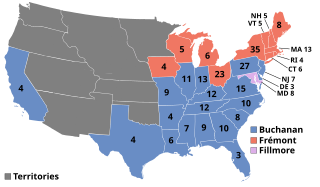
Presidential elections were held in the United States on November 4, 1856. Democratic nominee James Buchanan defeated Republican nominee John C. Frémont and Know Nothing/Whig nominee Millard Fillmore. The main issue was the expansion of slavery as facilitated by the Kansas–Nebraska Act of 1854. Buchanan defeated President Franklin Pierce at the 1856 Democratic National Convention for the nomination. Pierce had become widely unpopular in the North because of his support for the pro-slavery faction in the ongoing civil war in territorial Kansas, and Buchanan, a former Secretary of State, had avoided the divisive debates over the Kansas–Nebraska Act by being in Europe as the Ambassador to the United Kingdom.

William Boyd Allison was an American politician. An early leader of the Iowa Republican Party, he represented northeastern Iowa in the United States House of Representatives before representing his state in the United States Senate. By the 1890s, Allison had become one of the "big four" key Republicans who largely controlled the Senate, along with Orville H. Platt of Connecticut, John Coit Spooner of Wisconsin and Nelson W. Aldrich of Rhode Island.

Jonathan Prentiss Dolliver was a Republican orator, U.S. Representative, then U.S. Senator from Iowa at the turn of the 20th century. In 1900 and 1908 Republican National Conventions, he was promoted as a vice-presidential candidate, but he was never chosen.
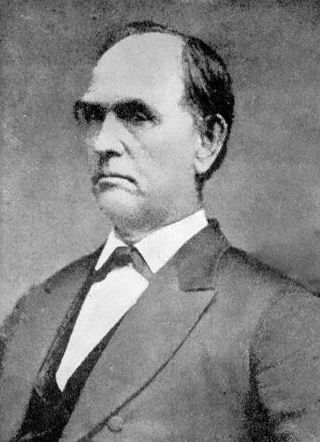
Augustus Caesar Dodge was a Democratic delegate to the U.S. House of Representatives from Iowa Territory, a U.S. minister to Spain, and one of the first set of United States senators to represent Iowa after it was admitted to the Union as a state. His father, Henry Dodge, served as a U.S. senator from Wisconsin; the two were the first and so far the only father-son pair to serve concurrently in the Senate, which they did from 1848 to 1855.

George Wallace Jones was an American frontiersman, entrepreneur, attorney, and judge, was among the first two United States Senators to represent the state of Iowa after it was admitted to the Union in 1846. A Democrat who was elected before the birth of the Republican Party, Jones served over ten years in the Senate, from December 7, 1848 to March 3, 1859. During the American Civil War, he was arrested by Federal authorities and briefly jailed on suspicion of having pro-Confederate sympathies.
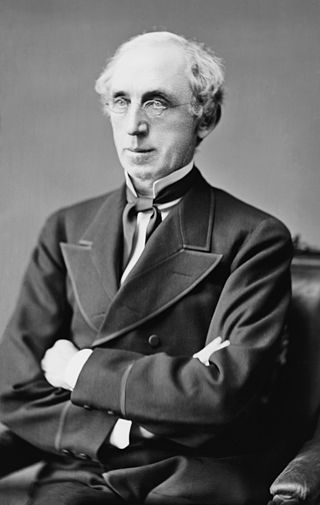
Henry B. Payne was an American politician from Ohio. Moving to Ohio from his native New York in 1833, he quickly established himself in law and business while becoming a local leader in Democratic politics. After serving in the Ohio Senate, Payne was elected to a single term in the United States House of Representatives in 1874. In the House, he worked unsuccessfully for a compromise in the debate over whether all of the nation's currency should be backed by gold. He was defeated for reelection, but served on the Electoral Commission that convened in early 1877 to resolve the dispute over the results of the 1876 presidential election.

Clyde LaVerne Herring, an American Democratic politician who served as the 26th governor of Iowa, and then one of its U.S. senators, during the last part of the Great Depression and the first part of World War II.
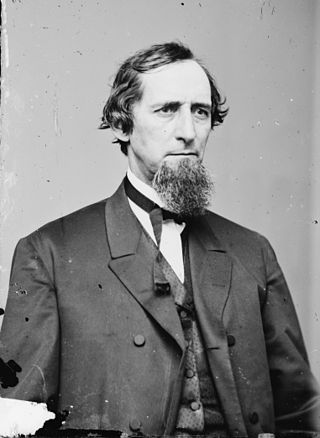
Edgar Cowan was an American lawyer and Republican politician from Greensburg, Pennsylvania. He represented Pennsylvania in the United States Senate during the American Civil War.
The 1940 Republican National Convention was held in Philadelphia, Pennsylvania, from June 24 to June 28, 1940. It nominated Wendell Willkie of New York for president and Senator Charles McNary of Oregon for vice president.

The 1888 Republican National Convention was a presidential nominating convention held at the Auditorium Building in Chicago, Illinois, on June 19–25, 1888. It resulted in the nomination of former Senator Benjamin Harrison of Indiana for president and Levi P. Morton of New York, a former Representative and Minister to France, for vice president. During the convention, Frederick Douglass was invited to speak and became the first African-American to have his name put forward for a presidential nomination in a major party's roll call vote; he received one vote from Kentucky on the fourth ballot.

The 1844 United States elections elected the members of the 29th United States Congress, and took place during the Second Party System in the midst of the debate over whether to annex Texas. Texas and Iowa joined the union during the 29th Congress. Democrats retained control of the House and took back control of the presidency and the Senate, re-establishing the dominant position the party had lost in the 1840 election.

The 2016 presidential campaign of Rand Paul, the junior United States senator from Kentucky, was announced on April 7, 2015, at an event at the Galt House in Louisville, Kentucky. First elected to the U.S. Senate in the 2010 election, Paul's candidacy for the Republican nomination for President of the United States in 2016 had been widely speculated since early 2013.
This is a list of notable political endorsements for declared candidates for the Republican primaries for the 2016 United States presidential election. Endorsements are part of the "invisible primary" process, which occurs not only long before the general election, but also largely occurs before even the caucuses and primaries have begun.
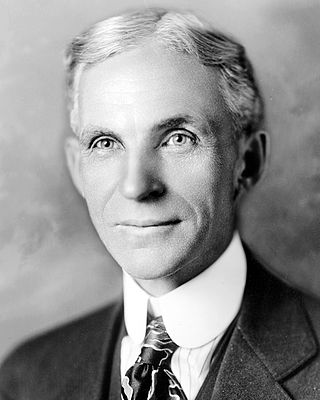
The 1918 United States Senate election in Michigan took place on November 5, 1918. Incumbent Republican Senator William Alden Smith did not seek re-election to a third term in office. In the race to succeed him, Republican former Secretary of the Navy Truman Handy Newberry defeated the automobile industrialist Henry Ford. Ford first challenged Newberry in the Republican primary and lost and then faced Newberry again, running as the Democratic nominee in the general election.

The 1964 United States Senate election in California was held on November 3, 1964.

The 2026 United States Senate elections are scheduled to be held on November 3, 2026, with 33 of the 100 seats in the Senate being contested in regular elections, the winners of which will serve six-year terms in the United States Congress from January 3, 2027, to January 3, 2033. Senators are divided into three groups, or classes, whose terms are staggered so that a different class is elected every two years. Class 2 senators were last elected in 2020 and will be up for election in this cycle.

In the 1891 Iowa State Senate elections Iowa voters elected state senators to serve in the twenty-fourth Iowa General Assembly. Elections were held in 32 of the state senate's 50 districts. State senators serve four-year terms in the Iowa State Senate.

In the 1889 Iowa State Senate elections Iowa voters elected state senators to serve in the twenty-third Iowa General Assembly. Elections were held in 22 of the state senate's 50 districts. State senators serve four-year terms in the Iowa State Senate.
References
- 1 2 3 "Senator Perry Engle". Iowa General Assembly. Retrieved 18 June 2022.